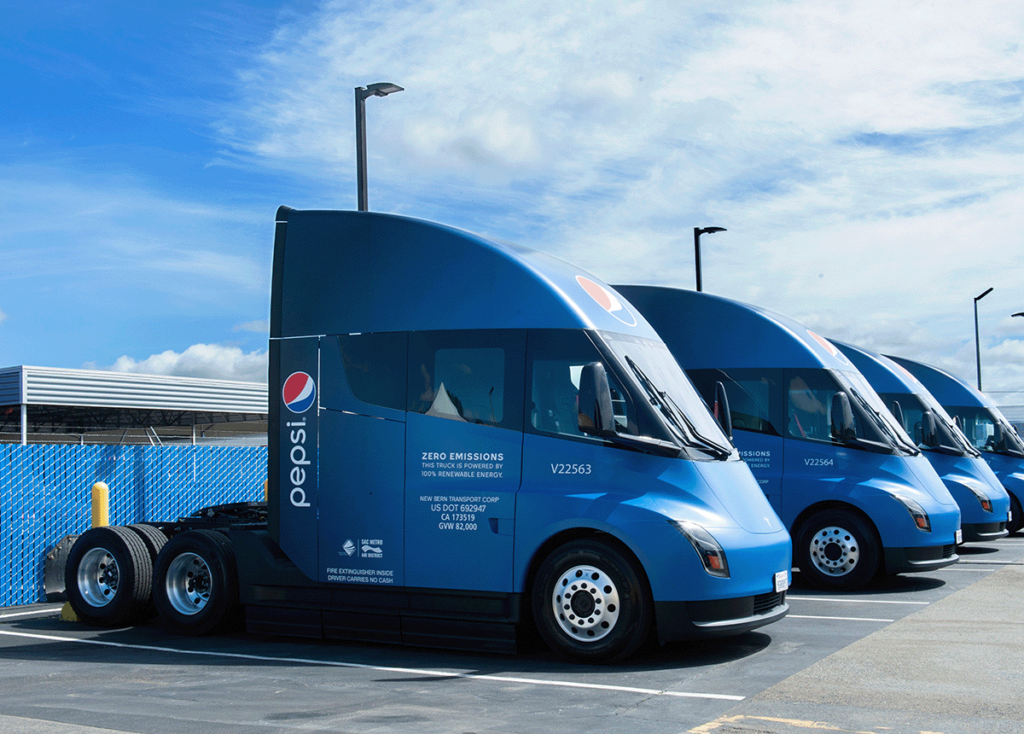Tesla’s Semi getting real-world traction, but widespread production yet to be achieved
Dan Priestley, manager of Tesla’s Semi program, began his keynote remarks at ACT Expo with a self-directed quip: “Tesla has a specialty of turning the impossible, into merely late.”
However, he added bringing the Class 8 electric Tesla Semi to market is “absolutely worth doing, and we do not enter this industry lightly.”

Tesla is currently running two versions of its Semi, a standard truck with 300 mile (480 km) range and another with up to 500 miles (800 km) range. These trucks, Priestly noted, are not only hauling potato chips, either. PepsiCo is putting them to work hauling heavy beverage loads, and Tesla uses them to haul battery packs from its Nevada Gigafactory to its car plant in Fremont, Calif.
“We see a lot of mountains and a huge variety of climates and conditions,” Priestley said of those runs. They require chaining up in the winter when tackling the Donner Pass, and taking advantage of 70 mph speed limits in the Nevada desert.
Semi weight
Priestley noted these trucks can be put into a typical fleet operation on a 1:1 basis, replacing a diesel-powered truck. The weight of the Semi has been tightly guarded by Tesla, but Preistley revealed the longer range version weighs “more than 23,000 lb.”
But he said engineers have consistently improved the truck’s efficiency; the Semi consumes 1.7 kWh per mile on average and as little as 1.5 kWh in lighter weight applications with an uptime of greater than 95%.
“Now it’s time for scaling,” Priestley said, noting Tesla targets building 50,000 such trucks a year which will bring down acquisition costs.
Tesla is also looking to roll out more charging stations for the Semi and sees a path to do so at a cost of $500/kW fully installed compared to an industry average of $1,000/kW.
The growth of Tesla’s car business since the Semi was launched in 2017 better positions the company to bring the truck to market, Priestley added.
“When we first unveiled this product in 2017, Tesla was a fraction of the company it is today,” he said.
Winter and desert tested
He noted Tesla has winter tested the Semi in Alaska at -35 F and in Death Valley at temps up to 120 F. “It sweated, but did really well,” he said of the desert testing.
Testing has been conducted in a variety of duty cycles from truckload, LTL, drayage and food services. “We’ll work with anybody,” Priestley said, although he acknowledged private fleets are easier as they have greater control of their cargo and facilities.
Tesla plans to maintain a direct to customer sales model. “We believe having that relationship directly with us puts us in a better position to make the customers’ operations successful,” he said.
Maintenance
PepsiCo is planning to take another 50 units and Tesla will put more on the road to support its own operations, with plans for a broader rollout now pushed to 2026. When it comes to service, Priestley said Tesla doesn’t look at maintenance and repairs as a profit center, but instead an obligation.
“We will ensure the service is there when you need it and it’s not our goal to it to be a major profit center for the company,” he said. “Anybody can do wheels and tires, take that,” he added of simple maintenance, while promising Tesla will have people available to address more complex issues related to powertrain performance.
Have your say
This is a moderated forum. Comments will no longer be published unless they are accompanied by a first and last name and a verifiable email address. (Today's Trucking will not publish or share the email address.) Profane language and content deemed to be libelous, racist, or threatening in nature will not be published under any circumstances.
Dan Priestley,
I’m reaching out as a long-time Tesla enthusiast with a deep admiration for the company’s innovative strides. For years, I’ve been eager to see a Tesla Semi up close, even entering a contest to drive one.
I have a unique vision: transforming a Tesla Semi into a motor home. I believe this could showcase the versatility and forward-thinking nature of Tesla’s technology. I’m aware that such a project would require a special license, but I’m more than willing to take that step.
Your consideration of this idea would mean a lot to me.
Thank you for your time & best of luck!